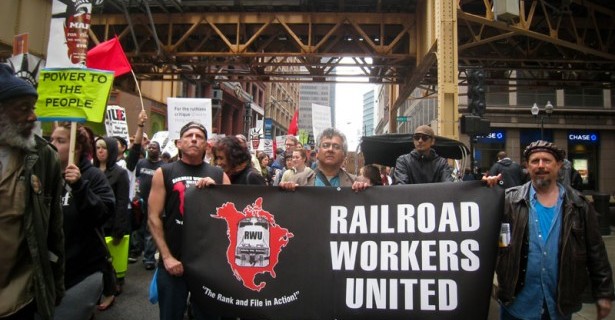Blood on the Tracks

Railway worker Steve Desavouret (L) says he was fired for whistleblowing. (Courtesy of Steve Desavouret)
http://inthesetimes.com/article/14836/blood_on_the_tracks/
Features » April 15, 2013
Railway whistleblowers get some federal protection at last.
BY Kari Lydersen
The 19th-century railroad boom enabled not only the settling of the American West, the industrial revolution and the growth of American cities, but also the creation of a new class of corporate owners. The railroad magnates of the 19th and early 20th centuries amassed such wealth and wielded such political clout that they seemed almost omnipotent. The 1886 U.S. Supreme Court case Santa Clara County vs. Southern Pacific Railroad Company is known as the first significant ruling to grant corporations the same constitutional equal rights protections as human beings.
In many ways, that sense of overwhelming corporate power has endured to the present, at least in major railroad companies’ relations with their employees. Railroad workers and their attorneys say—and federal courts and government regulators have agreed—that for decades there has been an endemic problem of retaliation by railroad companies against employees who are injured on the job or who speak out about safety hazards. Often the two issues go together: Injury investigations bring safety hazards to light.
Historically, the railroad industry had “a paramilitary mentality,” says Charlie Goetsch, an attorney who specializes in representing railroad workers. “In the army, if you refuse to obey an order, you’re shot or court-martialed. You do what I say or you’re fired or I make your life miserable. The workers had no power, no recourse to stand up against that. Railroad unions have been a powerful force, but they have had no ability to strike back when rail management retaliated against an individual employee for having the gall to report a safety hazard or a resulting injury. That continued on into the 21st century.”
But the industry may be in the early stages of a sea change, thanks to 2007 legislation protecting railroad workers that has been strongly backed by federal court rulings this year and complemented by policy changes and voluntary agreements involving the Occupational Safety and Health Administration (OSHA).
FULL story at link.
